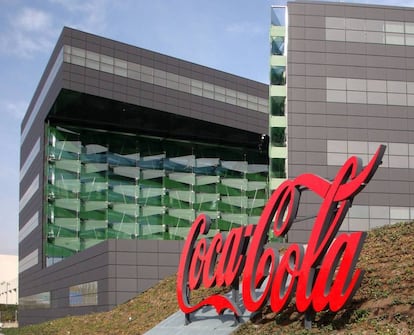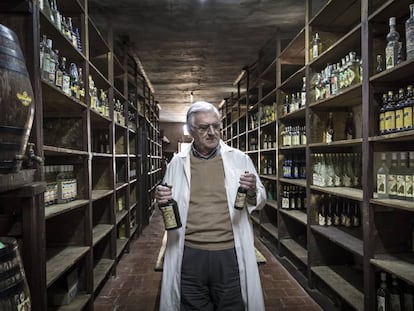Coca-Cola paying millions to medical and scientific societies in Spain
Beneficiaries deny a research bias, but study finds sponsorship serves company¡¯s commercial purposes

The Coca-Cola Company has paid €8 million to dozens of scientific and medical organizations in Spain between 2010 and 2017, according to the beverage giant¡¯s own figures.
But a study published by the European Journal of Public Health (EJPH) finds that ¡°research funded by the company is serving its commercial objectives that, in many cases, are at odds with efforts to improve population health.¡±
Scientists who work in public health cannot have conflicts of interest
Juan Pablo Rey-L¨®pez, University of Sydney
The biggest beneficiaries of Coca-Cola¡¯s research funds were the Ibero-American Nutrition Foundation (€835,000), the Spanish Heart Foundation (€640,000) and the Spanish Nutrition Foundation (€567,000). Also listed is the SHE Foundation (€363,000), which is headed by the cardiologist Valent¨ªn Fuster.
¡°Nutritional and cardiology organizations received the highest financial support,¡± says the study, signed by Juan Pablo Rey-L¨®pez of Sydney University and Carlos Alberto Gonz¨¢lez of the Catalan Institute of Oncology.
The World Health Organization (WHO) has urged governments to raise the price of sugary drinks by at least 20% in a bid to reduce consumption, which is linked to a global epidemic of obesity. And a team from the Harvard School of Public Health (HSPH) estimates that ¡°roughly 180,000 obesity-related deaths worldwide are associated with the consumption of sugary drinks.¡±
Their research linked sweetened beverages to 133,000 diabetes deaths, 44,000 deaths from cardiovascular diseases, and 6,000 cancer deaths. There are 106 grams of sugar in one liter of Coca-Cola Classic.
¡°Nobody could picture Marlboro sponsoring a gathering of the Spanish Society for Medical Oncology,¡± notes Carlos Alberto Gonz¨¢lez, an epidemiologist who co-wrote the EJPH study.
Gonz¨¢lez and his colleague Rey-L¨®pez analyzed 20 scientific papers that were sponsored by Coca-Cola, and found that 14 of them ¡°were aligned with marketing strategies used by Coca-Cola (e.g. focusing on physical inactivity as the main cause of obesity).¡± The other six papers were more neutral in their conclusions.
Sources at The Coca-Cola Company said that the independence of scientific societies and universities ¡°is guaranteed in all partnerships,¡± and noted that this sponsorship is declared annually as ¡°an exercise in transparency.¡±
Nobody could picture Marlboro sponsoring a gathering of the Spanish Society for Medical Oncology
Carlos Alberto Gonz¨¢lez, Catalan Oncology Institute
¡°Coca-Cola is copying the strategies of the tobacco industry,¡± says Gonz¨¢lez, who in 1992 was in charge of coordinating the Spanish contribution to the WHO¡¯s European Prospective Investigation into Cancer and Nutrition (EPIC) study.
Gonz¨¢lez and Rey-L¨®pez mentioned a recently aired email exchange between two former vice-presidents of Coca-Cola ¨C Michael Ernest Knowles and Alex Malaspina ¨C as evidence of the industry¡¯s efforts to influence scientific organizations. ¡°We have good contacts in some [medical associations] and we should encourage them to address public health matters and ¡®suggest¡¯ appropriate topics,¡± says one message from Knowles to Malaspina.
In Spain, Coca-Cola has given €420,000 to the Spanish Society for Community Nutrition, €400,000 to the Spanish Society of Primary Care Physicians, €357,000 to the Diabetes Foundation and €350,000 to the Spanish Pediatrics Association. The funds are typically used to organize symposiums and conduct scientific research. It is a regular practice at food multinationals such as Danone and at some of the beer industry¡¯s largest companies.
Coca-Cola and Valent¨ªn Fuster

In October 2010, the prestigious Spanish cardiologist Valent¨ªn Fuster was one of the keynote speakers at the 1st International Happiness Congress, organized by Coca-Cola. On January 20, 2014, the Science, Health and Education (SHE) Foundation, which he presides, received €363,000 from the beverage company.
The foundation¡¯s general manager, Carlos Peyra, explains that the funds will sponsor a health promotion initiative in Cardona, a municipality of 5,000 residents in Barcelona province.
¡°The goal of the project is to improve the health of the residents of Cardona using an innovative combination of events, programs and urban design so they can build a culture of health in the city,¡± says Peyra.
¡°I am an independent scientist. Coca-Cola has never told me what to do,¡± says Marcela Gonz¨¢lez Gross, a professor at Madrid Polytechnic University, an institution that has received €243,000 from the beverage company. Gonz¨¢lez Gross is the main author of the Food Pyramid Study, funded with €13,700 from Coca-Cola.
¡°Children like to consume different kinds of drinks, especially sweet ones such as juices and sodas. This is because they have a taste preference for sweet foods, and because their energy needs are greater than adults¡¯. These drinks can be offered in moderation, but should not be the only ones they consume,¡± reads a guide for parents written by Gonz¨¢lez Gross and available on the Coca-Cola website.
As for Gregorio Varela, president of the Spanish Nutrition Foundation, he does not believe that the €567,000 his organization has received from Coca-Cola is harmful to its image. The money, he says, was used to finance the scientific study ANIBES, which pools data about food, nutrition and physical activity in Spain. ¡°The subgroup made up of sugary drinks makes up 2.0 % of total energy intake (36 kcal/day out of a total of 1,810 kcal/day),¡± reads one of the reports.
¡°A study of this scope could not have been done without support from Coca-Cola,¡± says Varela, a professor of nutrition at CEU San Pablo University who feels that sweetened drinks ¡°in excessive amounts are no doubt bad for public health, but consumed from time to time, it doesn¡¯t have to be that way.¡± Varela does not feel the need for a tax on sugary drinks in Spain.
¡°Coca-Cola Spain offers an alternative with no added sugar in each of its brands, it is reducing the sugar content in its classic varieties, and it has designed new, smaller containers to reduce the sugar intake per consumption unit,¡± say sources at the company. ¡°In the last 17 years we have managed a 45% reduction in the sugar content per liter in total sales for Coca-Cola Spain. In fact, 38% of sales of Coca-Cola in Spain are for products without added sugar.¡±
¡°I don¡¯t think any food is bad for your health unless you consume it in inappropriate amounts. Sugary drinks should be consumed sporadically. I can drink an horchata, which also has 10% sugar content, or a Coke,¡± says the biologist ?ngel Gil, who teaches at Granada University and presides the Ibero-American Nutrition Foundation.
The foundation manager, Miguel Fern¨¢ndez, notes that the amount they have received from the beverage company is €123,000 lower than listed on the company website (€835,000). A third of these funds were allotted to a traveling exhibition, Nutrici¨®n, impulso vital, meant to encourage healthy habits. ?ngel Gil feels that ¡°we should demand that Coca-Cola and Pepsi reduce sugar content,¡± but he, too, opposes the WHO recommendation of a tax on sugary drinks.
¡°Scientists who work in public health cannot have conflicts of interest; they cannot receive money from companies that are harming people¡¯s health,¡± says Rey-L¨®pez in a telephone interview from Sydney University. This epidemiologist says that obesity is ¡°a socially communicable disease¡± that is tied to poverty. ¡°A two-liter bottle of Coca-Cola is practically cheaper than a bottle of water. There are population segments, especially in the lower income bracket, who sit down to meals with a two-liter bottle of Coca-Cola on the table. And that is bad for one¡¯s health,¡± adds Carlos Alberto Gonz¨¢lez. ¡°Partnerships between health professionals and industries that harm public health should be viewed as marketing strategies by the industry to protect its profits.¡±
English version by Susana Urra.
Tu suscripci¨®n se est¨¢ usando en otro dispositivo
?Quieres a?adir otro usuario a tu suscripci¨®n?
Si contin¨²as leyendo en este dispositivo, no se podr¨¢ leer en el otro.
FlechaTu suscripci¨®n se est¨¢ usando en otro dispositivo y solo puedes acceder a EL PA?S desde un dispositivo a la vez.
Si quieres compartir tu cuenta, cambia tu suscripci¨®n a la modalidad Premium, as¨ª podr¨¢s a?adir otro usuario. Cada uno acceder¨¢ con su propia cuenta de email, lo que os permitir¨¢ personalizar vuestra experiencia en EL PA?S.
?Tienes una suscripci¨®n de empresa? Accede aqu¨ª para contratar m¨¢s cuentas.
En el caso de no saber qui¨¦n est¨¢ usando tu cuenta, te recomendamos cambiar tu contrase?a aqu¨ª.
Si decides continuar compartiendo tu cuenta, este mensaje se mostrar¨¢ en tu dispositivo y en el de la otra persona que est¨¢ usando tu cuenta de forma indefinida, afectando a tu experiencia de lectura. Puedes consultar aqu¨ª los t¨¦rminos y condiciones de la suscripci¨®n digital.











































